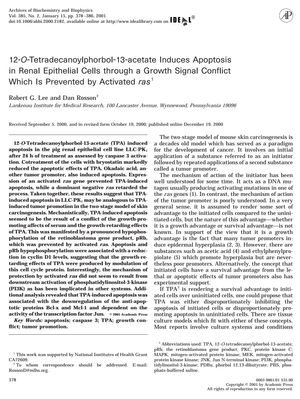12-O-Tetradecanoylphorbol-13-Acetate Induces Apoptosis in Renal Epithelial Cells Through a Growth Signal Conflict Prevented by Activated Ras
January 2001
in “
Archives of Biochemistry and Biophysics
”

TLDR Activated ras can protect kidney cells from a certain substance that causes cell death.
The study from January 1, 2001, demonstrated that 12-O-Tetradecanoylphorbol-13-acetate (TPA) triggers apoptosis in pig renal epithelial cells (LLC-PK₁) after 24 hours, which is indicated by the activation of caspase 3 and can be reduced by co-treatment with bryostatin or by expressing an activated ras gene. The apoptosis is suggested to result from a conflict between growth-promoting serum effects and growth-retarding TPA effects, leading to hypophosphorylation of the retinoblastoma gene product (pRb) and a decrease in cyclin D1 levels. This process is dependent on Jun activity and involves downregulation of anti-apoptotic proteins Bcl-x and Mcl-1. The study concludes that activated ras can protect against TPA-induced apoptosis, providing insights into tumor promotion mechanisms.




